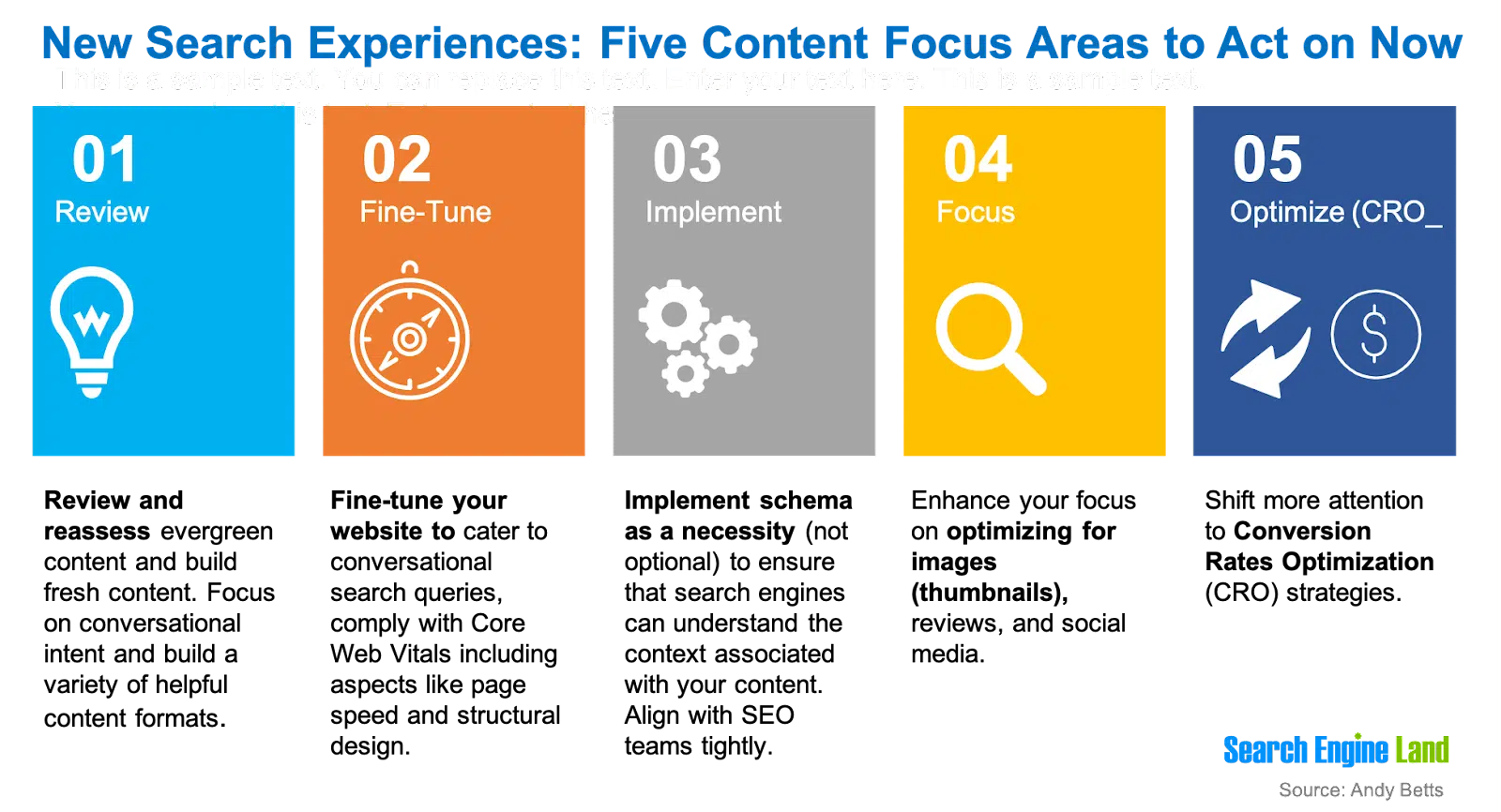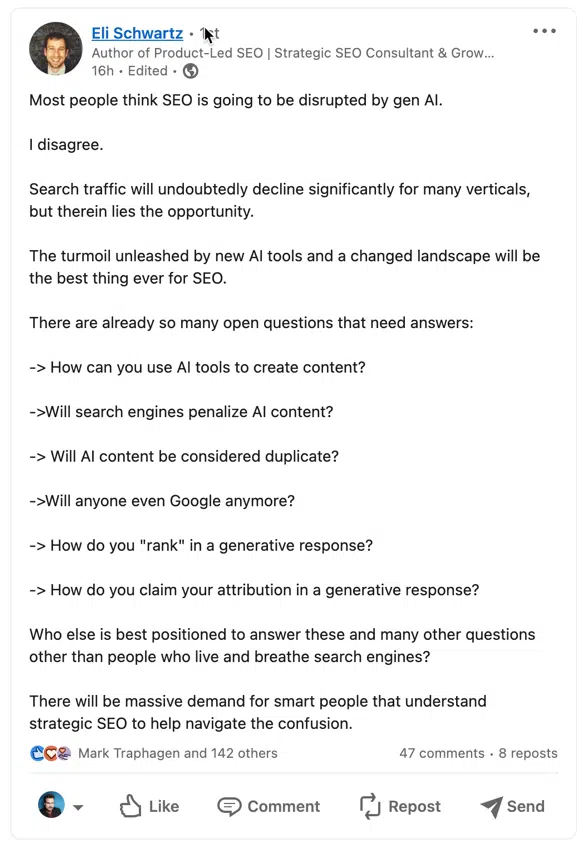How your approach to content needs to change: People, process and technology
The dynamics of content optimization in the age of AI and evolving user preferences, and how to balance AI assistance with human creativity.
The search and content landscape has significantly changed since the start of 2023.
As the usage of generative AI applications soars and search engines integrate AI into the SERP results, a fresh content battleground has emerged.
Consequently, content optimization is evolving, shaped by the dynamic interplay between people, processes, and technology. This process is becoming less linear and more fluid.
Before we dive into that, let’s examine the driving forces behind these changes.
People’s preferences drive key changes in search and content environments
Online consumers have evolved, demanding instant, relevant, and accurate answers to their questions and needs.
In addition, as they search for information across multiple platforms, such as social and video platforms, we are seeing an increase in preference for not just text but a variety of visual content.
For instance, short-form videos are popular with consumers. Leading social media platforms like TikTok, Instagram Reels, and YouTube Shorts are now favorites among brands.

These key consumer preferences drive innovations in search and content marketing, especially as they aim to provide consumers with new experiences and ways to find and digest information.
This changes how content is represented online and how the focus on optimization becomes more vital and diverse.
Key content and optimization shifts
Ensuring optimized content has always been crucial, as it guarantees that search engines and users can easily comprehend it.
In the past, some marketers would optimize content regardless of its quality.
They would also optimize it solely for search engines, focusing on keywords and intent with low search volume.
The content was siloed, and lots of generic topical content, no accurate or authentic detail and no structure, but it still got results on search engines.
The critical shift we see is that generative AI is now being used to provide content production and optimization recommendations to improve visibility and reach on search engines and social media.
As search experiences change, new areas for optimization open up, and certain areas become more important than others.
Generative AI and search engine innovations: Creating a new content battleground
A fresh battleground for content marketers is emerging – one where not just every individual and brand but even machines have taken up the pen to become authors and publishers.
A combination of humans and machines is now churning millions of new content daily.
Consequently, content marketing professionals confront a level of change and competition that has never been seen before.
This change has been driven by consumer preferences and the growth of AI into the mainstream in two key areas.
1. Rise of ChatGPT and generative AI applications
Tools such as ChatGPT, Google Bard, and Microsoft Bing AI are revolutionizing how content marketers generate new ideas, identify patterns and trends, and automate tedious tasks.
Among these tasks are:
- Market and keyword research and keyword list segmentation for content campaigns.
- Content clustering via grouping similar content based on language and context to identify content gaps, areas of overlap, and opportunities for cross-linking.
- Monitoring and analyzing social media conversations to identify trends and topics relevant to content creation.
- Automated A/B testing of content in ads, landing pages, and other campaigns.
- Creating detailed buyer personas.
- Personalization via analysis of customer behaviors and other analytics data.
- Creating and optimizing images and videos customized to fit the content. campaign’s objectives – I will share more on that later.
Beyond text-based content, the standalone tool market is exploding with thousands of new entrants using a combination of APIs and their own technology to provide diverse output for multiple content use cases.
These are not limited to generating content but extend to personal and recreational use, voice, music, coding, audio production, image and visual creation, video making, and podcasting.
2. Integration of AI into search engines
The focus on producing quality, relevant, and trustworthy content has never been so important, especially as the fine lines between content and SEO diminish.
This is why Google has placed much focus on improving user experiences by rolling out and refining its Helpful Content Update (HCU) and re-emphasizing its E-A-T guidelines with E-E-A-T.
As Google rolls out access to its Search Generative Experiences (SGE) and AI-led innovations via Search Labs (currently only available in the U.S.), we get a glimpse of how it integrates AI into results and how content in the SERP results are changing.
Before I go further, it’s important to note that this is experimental and changing daily.
However, I think there are enough signals (including updates from Google’s blog) to make informed decisions on what content marketers need to prepare for, optimize, and execute in the future.

In its generative AI snapshot, Google’s LLM (Large Language Model), PaLM 2, and MUM (Multitask Unified Model) help it identify multiple types of content and media formats.
In addition, as Google continues to focus on human experiences and content, it is starting to prioritize experience-driven, authoritative content and recommendations.
Results in the SERPs aim to highlight content that showcases real experiences of topics, products, and services according to Google’s E-E-A-T.
Perspectives, in particular, focuses on user-generated content (UGC) and showcases varied perspectives via multimedia content from boards, QandA channels, and social media.
Dan Taylor wrote a great piece on optimizing content specifically for Perspectives.
Change equates to enhancing content optimization focus and conversion rates
Conversational intent is the trigger for Generative AI results.
While both Generative AI and search engine results pages (SERPs) continue to evolve – and they haven’t quite reached a stable state yet – gaining a grasp on conversational intent remains critical.
If your content fails to provide valuable insights or accurately address a conversational query, its visibility will likely dwindle.
Ensure you are keeping up to date with all algorithm updates and quality sources of information.
- Understand conversational intent as the key trigger to generative AI results.
- Focus on value for the reader – the need to understand your audience needs to deepen.
- Balance this with informational and transactional content.
- Prioritize natural language – anticipate “how” questions and answer with “to.”
- Build and optimize fresh content. Balance long, short and snackable content formats, as evergreen content won’t cut it anymore.
For content to truly thrive in the future, it necessitates an explicit purpose.
Standing out from the crowd with your content is crucial for discoverability and engagement. If consumers don’t engage, they are less likely to convert.
This means it is time to:
- Review and reassess evergreen content and build fresh content. Focus on conversational intent and create a variety of helpful content formats.
- Fine-tune your website to cater to conversational search queries and comply with Core Web Vitals, including aspects like page speed and structural design.
- Implement schema as a necessity (not optional) to ensure that search engines can understand the context associated with your content. Align with SEO teams tightly.
- Enhance your focus on optimizing for images (thumbnails), reviews, and social media.
- Shift more attention to conversion rate optimization (CRO) strategies.

As Google strives to showcase a diverse array of content from various sources and users, refining its content system to provide more valuable and pertinent information, it is essential to adhere to its Helpful Content Updates (HCU) and enhanced E-E-A-T guidelines.
Therefore, pay increased attention to the following:
- Diversifying your content strategy by creating various types of content in an array of formats – emphasizing particularly video and image-based content.
- Allocating resources to developing authoritative profiles (E-E-A-T: Experience, Expertise, Authority, Trustworthiness) for your content creators.
- Exploring the possibility of incorporating more user-generated content from platforms like YouTube and TikTok for trust signals.
Going forward, optimizing for engagement and conversion will become indispensable.
While traffic remains crucial, Google’s new Search Engine Results Pages (SERPs) could decrease top-level site traffic.
However, the traffic reaching a site will likely be more targeted, potentially increasing the conversion rate.
The future and the vital interplay of people, process and technology
This framework represents the best way to approach content strategies as the emerging alliance between humans and AI accelerates.
After all, people perform specific tasks focusing on organizations using processes often streamlined and improved by technology.
People: Humans should always take the lead at the front and the end of processes
Let’s, get something out of the way here.
AI will not replace your role, provided you learn how to utilize it. Simple, right?
- The emotional understanding inherent in us as human beings empowers us to perceive and react to the sentiments and emotional states of others. Empathy and common sense are crucial aspects of human interaction, especially in content marketing.
- Though AI has the capacity to discern emotion in written words and construct responses that suit the context, it is incapable of authentically experiencing feelings or forging genuine, empathetic bonds.

Process: Generative AI injection means that content processes need to be refined
For me, this is a big area that connects people and technology.
Content strategists (people) can leverage AI-powered resources for everything I have mentioned in the article.
- Ensure you and your teams build into your processes how AI can augment your content workflows.
- Focus on aligning around practical use cases and experiments.
- As new search and content landscapes and avenues open up, consider the interplay of content, SEO, Social, and PR. Think about trust signals as the output.
In terms of utilizing AI for content creation and optimization, ensure you have humans’ lead inputs, choose the correct application, and edit with a human perspective.
Technology (AI): Can inform and assist front, middle, and end of processes
AI is a potent ally in many areas of your workflows and processes.
It does this by enhancing productivity, scrutinizing massive data sets, and boosting the quality of your content.
- SEO AI-led insights, in particular, can inform and guide you toward the types of content that effectively engage audiences and the most successful formats – not just for your business but for your competitors.
As Eli Schwartz shares on LinkedIn, the AI evolution will be great for SEO. I also think it will be great for content and omnichannel marketers.

- In addition, automation frees up your time by taking over the mundane and repetitive tasks so you and devote time to being creative and working closely with other teams I mentioned above.
- Always remember, AI’s role in content should be to inform and assist, to inspire and help action.
- Do not forget conversion rate technology
AI and SERP evolutions open up a whole new realm of opportunities for content and SEO marketers to shine.
Contributing authors are invited to create content for Search Engine Land and are chosen for their expertise and contribution to the search community. Our contributors work under the oversight of the editorial staff and contributions are checked for quality and relevance to our readers. The opinions they express are their own.
Related stories